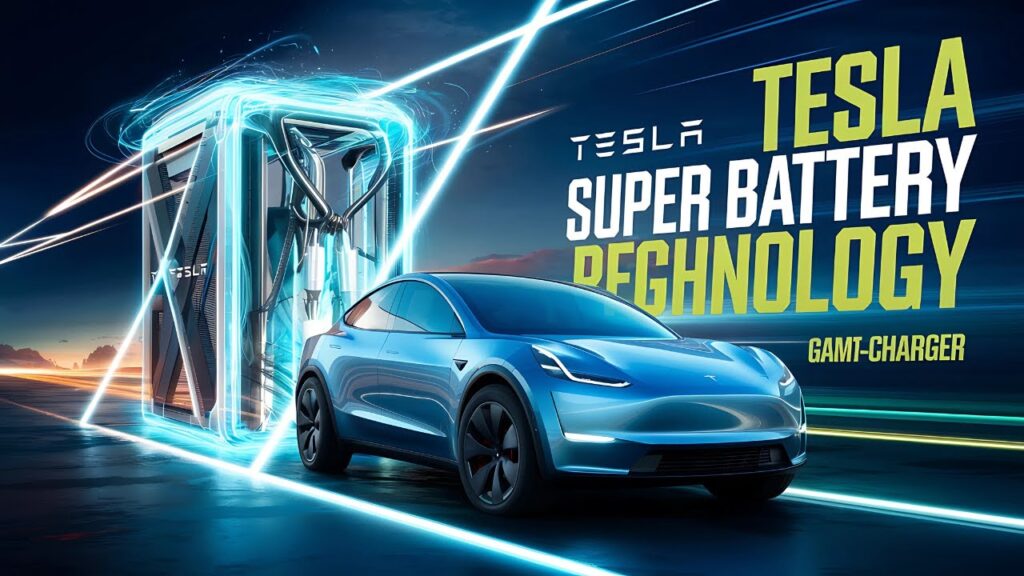Elon Musk has just unveiled a groundbreaking development that could revolutionize the electric vehicle (EV) industry: Tesla’s new super battery technology. This innovation promises to drastically outpace even fierce competitors like BYD and IM Motors, bringing the EV market one step closer to a future of truly sustainable and efficient driving.
With an incredible 657 miles of range on a single charge, Tesla’s new battery technology is set to transform the landscape of electric mobility. In this post, we’ll dive into the details of this remarkable battery innovation, compare it with emerging battery technologies from rivals, and explore how it could shape the future of EVs.
Tesla’s New Super Battery: A Game Changer for EV Range and Charging
Imagine a battery that doubles the energy density of traditional EV batteries and offers over 657 miles of range. This is not science fiction—it’s the future of Tesla’s electric vehicles. While competitors have made impressive strides in battery technology, Tesla’s new super battery seems poised to set new standards in the EV industry.
But what makes this battery so special, and how does it compare to the innovations coming from other leading manufacturers?
Tesla vs. IM Motors: A Battle for EV Battery Supremacy
IM Motors, a rising star in the EV world, has recently made waves with its semi-solid-state battery in the IM L6. This battery promises an impressive 1,200 km (745 miles) range on a single charge, powered by just 13.7 kg of energy storage. However, while the semi-solid-state battery has significant potential, its real-world performance remains uncertain due to its reliance on CLTC (China Light Duty Vehicle Test Cycle) conditions. Plus, its charging speed of 12 minutes for an additional 400 km of range—while impressive—falls behind Tesla’s ultra-fast charging capabilities.
Do you think the IM L6‘s range and cutting-edge battery tech make it a strong contender, or will its slower charging speed hold it back? Drop a comment below and let us know your thoughts.
BYD’s High Energy Blade Battery: A Strong Competitor
BYD’s high-energy blade battery has garnered attention for its 210 Wh/kg energy density, offering extended range for electric vehicles. Despite its achievements, the blade battery struggles when it comes to fast charging speeds, requiring around 20 minutes to fully charge. This slower charging time contrasts sharply with Tesla’s lightning-fast charging solutions. However, BYD has aggressively reduced the cost of its blade batteries, making them more affordable than ever before. The company’s future plans include launching Blade 2.0, which promises to push the boundaries of both energy density and charging speed.
However, the question remains: Can BYD’s battery tech overcome the charging speed limitations to rival Tesla’s all-encompassing fast charging ecosystem?
The Ongoing Price Wars: Can Tesla Keep Its Competitive Edge?
As EV battery prices continue to plummet, with projections suggesting they could fall by 50% by 2026, the battleground is shifting from price wars among automakers to fierce competition between battery manufacturers. This shift means that, while range and energy density are important, charging speed will become an even more critical factor in determining consumer choice.
Tesla’s 4680 battery offers an edge by balancing energy density with super-fast charging, making it the most well-rounded option for EV owners. But how does Tesla’s 4680 cell stack up against IM Motors’ semi-solid state and BYD’s blade batteries?
Tesla’s 4680 Battery: A True Game Changer
Tesla’s 4680 battery is not just another incremental update; it’s a game-changer that addresses the trade-offs faced by competitors like IM Motors and BYD. Compared to IM Motors’ battery, which boasts a 1,200 km range, the 4680 battery delivers 30% more energy density, while reducing battery weight, resulting in a lighter and more efficient vehicle. This leads to higher real-world range and better performance without relying on large, cumbersome battery packs.
Tesla’s supercharging network and thermal management also give the 4680 battery a significant edge in fast charging. Unlike IM Motors’ 3C maximum charging rate or BYD’s 3C charge limit, the 4680 battery supports faster charging speeds for long-distance trips. This means that Tesla owners can recharge quickly, reducing downtime on long journeys.
How Tesla’s Battery Outperforms Rivals in Charging Speed and Range
When comparing BYD’s ultra-fast charging technology, which promises a 7.5-minute charge at an 8C rate, there’s a clear trade-off in energy density. BYD’s high-speed charging battery reaches a maximum of 160 Wh/kg, which results in limited range for long-distance travel. In contrast, Tesla’s 4680 battery achieves a competitive energy density while maintaining superior fast-charging performance.
Tesla’s vertically integrated manufacturing process, including in-house production of cathodes and partnerships with raw material suppliers, gives the company a scalability advantage that BYD and IM Motors struggle to match. Tesla is on track to produce 100 GWh of 4680 cells annually by 2024, enough to power over 1.3 million vehicles a year.
Conclusion: Why Tesla’s New Super Battery is a Game-Changer
In conclusion, Tesla’s new super battery is a major step forward in the world of electric vehicles. With its 657-mile range, fast charging capabilities, and competitive energy density, the 4680 battery positions Tesla as the leader in EV technology. While competitors like IM Motors and BYD have made significant strides in battery development, Tesla’s supercharger network, cost optimization, and scalability are setting it up to dominate the market.
The future of electric vehicles is here, and Tesla’s new battery technology is leading the way. With advancements in charging speed, range, and cost reduction, the competition in the EV market is only going to heat up. What are your thoughts on Tesla’s new super battery? Do you think it will continue to lead the way, or will other companies like BYD and IM Motors close the gap?
Read More:

